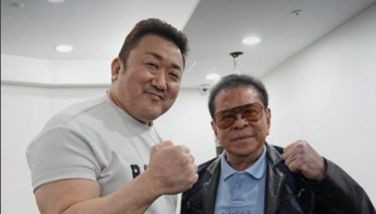Covering Duterte

GMA news reporter Joseph Morong, who will host a new online show on how to tell factual reports from fake news, says that netizens keep journalists on their toes and challenge them to do better
MANILA, Philippines — Kapuso reporter Joseph Morong has been tailing President Rodrigo Duterte since he came into power in 2016. Covering the Malacañang may be considered the prime beat for news reporters, but it’s been one tough assignment for Joseph.
“Alam mo, mahirap talaga si President Duterte i-cover kasi ang schedule ay dikit-dikit (You know, it’s really difficult to cover President Duterte because his schedule is tight). And I think meron kang learning curve na-surpass because for the first couple of months, it was really hard. I was not familiar with his manner of speaking, his thought process, so I had to study him... (How?) Of course, yung nakakasama namin from Davao (press), for example, they would say, ‘That’s not the way he speaks,’ so you check baka nga ganun, and then you observe, observe, observe. You have to study your subject,” the 2015 Marshall McLuhan Fellowship awardee said.
“Sometimes, your perception of (Duterte), your theories about him (get to be validated), ‘Ah tama yung theory ko na if he speaks this way, sometimes, the emphasis, or may mga bagay na sobrang outlandish pero kailangan mo siyang i-distill (to know) what he really meant for that.’ After a couple of months, you will learn. The problem is when somebody is coming in from the cold, first time to cover the President, malulula ka kasi di ba madaldal si President Duterte (you will be overwhelmed because the president is fond of talking)?”
He said that they always have to update their reports, especially when covering consecutive speeches in a day, because the latest one might offer something new, if not more explosive info. “It’s really a challenge.”
Asked if the President’s perceived “love-hate” relationship with the media has since improved, Joseph said, “Alam mo, iba kasi ang perception sa actual eh.” He cited, as an example, one reporter who has been repeatedly bashed on social media for supposedly “biased” reports as actually “very close” to the President in a “lolo-apo” kind of way.
To recall, the tough-talking, former Mayor of Davao City also declared a media blackout at the onset of his administration. It didn’t last long. “(Duterte) was the one who initiated it (the cancellation of the media blackout). We didn’t even ask for it,” Joseph recalled.
The broadcast journalist believes that President Duterte acknowledges the “adversarial” role of the press, “And he said that. Kung meron si (President) ng ganung recognition, cool, OK na yan. We’re not out to destroy him or what, we’re just here to do our job. I think he acknowledges the role, that’s why he changed the spokesperson (to former congressman and human rights lawyer Harry Roque).”
The Malacañang Press Corps (or MPC, the core group covering the Palace) also has had some very public “disagreements” with Asec. Mocha Uson who handles the Presidential Communications Operations Office’s (PCOO) social media efforts. She also happens to be the most prominent supporter of the President online, commanding over five million followers. Uson had said that the MPC is against the PCOO’s move to give Filipino social media practitioners and bloggers access to presidential activities.
Joseph said that they don’t have any problem with the social media accreditation. “May mga trabaho kami na kailangan gawin. (Asec. Mocha) has to do her thing, we have to do our job. For as long as walang interference, okay kami dun. In fact, the position on whether to allow (bloggers) is really not up to us, wala naman kaming policy-making input… If you want to cover the President like we do, please do so because you have your constituents. Sana may respeto ng trabaho, if you have to do your thing, good yan, but we also have to do our job. I don’t think we have the time to bother with these things because of the schedule. Parang uunahin ko pa ba makipag-away when we have how many speeches to record, analyze and write about? If they want to cover, fine with us, what we’re saying at MPC is equal access, what they have, what they will provide, will be provided to everybody.”
Apart from his Palace assignment, Joseph has taken a new job as host of one of the three, new online shows of GMA 7 to debut on Jan. 1, 2018, 5 p.m., via the network’s YouTube account. Titled Fact or Fake with Joseph Morong, the show that targets millennials, he said, will define what fake news is as opposed to mistakes, misinformation and disinformation, will go back to one of the tenets of journalism which is fact-checking and will confront online audience with facts in hopes of helping them discern whatever they read online, especially in the lead-up to the 2019 elections.
“The topics are controversial. GMA will join the fray on the subject of fake news... I think this is a good time for GMA to enter the picture, and define our rule in that kind of context... We are a major media network, and you know the criticism against mainstream media. So, given the context, we have to be sure with what we put out there.”
Asked if he was ever accused by netizens of peddling “fake news,” Joseph said, “Our definition for fake news is a lie that presents itself as a news, (there’s an) intention to lie and to masquerade as news. Given that definition, there was that one time and, I think, I was in Vietnam, meron incident dun na yung Facebook Live ng press conference ni President Duterte, may na delete na part and I saw that and I wrote about it. It turned out that there was a YouTube upload by RTVM (government channel) that reflected the soundbite. They were accusing me of being fake news but given the definition, it was a mistake that a lot of people commit, but we did not intend to lie.”
Asked if he thinks the increasing number of people sharing and believing in fake news means that news media is losing credibility, Joseph said, “There are several theories about it. Sometimes, people will share what they believe in, parang mahirap mag-debunk if someone really believes that to be true. Yung criticism, yung may shortcoming ang media, in a way, it could be. Considering the speed by which we produce news, if hindi tayo careful, may mga errors, but it’s not fake news. Because fake news, there’s an intention to lie, to present itself as news. If a journalist makes a mistake and corrects it, it’s not fake news.”
For any journalist though, this presents the challenge to consistently come up with well-done, not sloppy work. “In the face of fake news, I think we have to be very strong in our job, we have to go back to the basics, fact-checking, verification. We’re doing it but we must highlight it more because I think, people do not understand how we work. Like in a presscon, if they open it in a Facebook Live, sasabihin ng mga tao sa mga comments, bakit paulit-ulit yung mga questions. Tama yung observation na yan na paulit-ulit but they don’t know that we have to repeat certain things because we have to be certain. I guess, if they understand how we work, they will be able to approach our product, which is the news, on a more positive way.”
While the ever-growing online audience is also being associated with haters and trolls, Joseph said there’s a positive side to serving and engaging netizens. “They’re critical to a fault, maraming opinion sa lahat ng ginagawa mo, and that’s good because it keeps you on your toes. As journalists, we shouldn’t shy away from that. It’s just going to make us better.”
- Latest
- Trending






















 Exclusive
Exclusive







